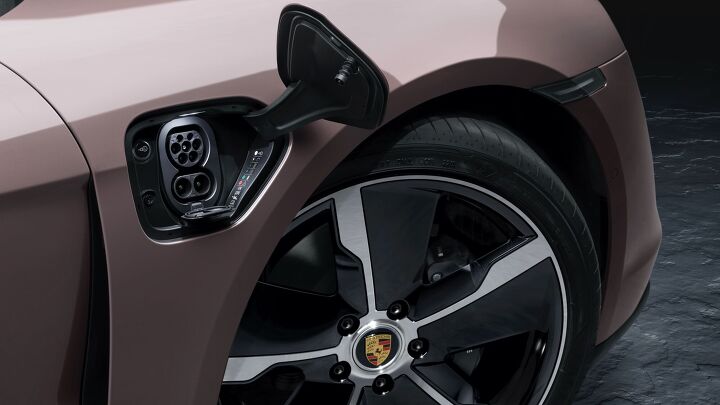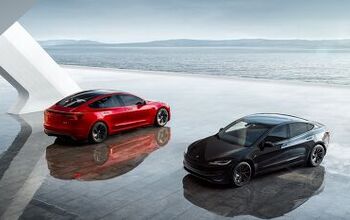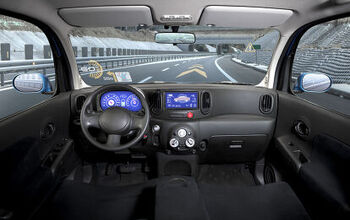Porsche Casts Doubt Upon Combustion Ban Timeline

While we’re constantly hearing about tightening emissions regulations, the relevant timelines issued by government actors are rarely adhered to. Electric vehicle subsidies went from temporary to indefinite and combustion bans have gone from right around the corner to anyone’s guess. This is also true of the industry itself, which often makes bold promises designed to appease a subset of the public only to repeatedly move the target date back a few years.
With this in mind, Porsche’s CFO was recently quoted as saying European combustion bans will probably need to be delayed and there’s good reason to believe him.
As things currently stand, the European Union has plotted banning the sale of new combustion-engine cars by 2030. However, Porsche Chief Financial Officer Lutz Meschke was quoted by Automotive News on Thursday casting some doubts.
"There's a lot of discussions right now around the end of the combustion engine," Meschke said in Singapore. "I think it could be delayed."
Despite Europe having adopted battery electric vehicles far more quickly than North America, the market is still confronting a lot of the same problems. In 2022, the EU estimated that 21.6-percent of all new car registrations were electric vehicles. That number was presumed to be around 5.9 percent in the United States, according to data accumulated from Kelly Blue Book.
While the EU does tend to lump plug-in hybrids into EV sales tabulations, the region is still outpacing the United States and Canada in terms of both PHEV and BEV volumes. But we continue to see similar complaints about public charging sites, fumbled vehicle launches, and have witnessed global electric sales begin to plateau by summer of 2023. Manufacturers have also signaled they’ll need more time to finish constructing EV facilities and started grumbling about subsidies being cut off.
It appears that European electrification efforts are confronting the same issues faced everywhere — leading to predictable results. UK Prime Minister Rishi Sunak announced the country would be pushing back a national combustion ban until 2035 last September and everyone is wondering if the European Commission will follow suit.
From Automotive News Europe:
A slowdown in EV orders has thrown into question whether the European Union is on track for the phaseout, which represents one of the most ambitious efforts to curb carbon emissions.
The region's consumers have been put off by a lack of reliable charging networks, persistently high prices and the rollback of EV incentives. The U.K. has already postponed its planned ban of new gasoline and diesel models by five years to 2035.
While manufacturers of premium and luxury EVs can work without subsidies, cutting them from the volume segment is wrong, said Meschke, who spoke on the sidelines of the unveiling of Porsche's long-delayed electric Macan SUV.
"We have to see how steep the ramp-up curve is in coming years," Meschke said. "If we have a situation like now, with certain reluctance to buy electric cars in Europe, then maybe the subsidies will come back."
Your author has repeatedly suggested ending electric vehicle subsidies, so it’s impossible to provide an unbiased take on the value of EV subsidies. The issue has also become stupidly divided along political lines, ensuring that hoards of people will cheer for opposing outcomes without giving it much thought. But it’s undeniable that the automotive sector is highly influential thanks to aggressive lobbying efforts and grossly overestimated its abilities to transition toward all electric vehicles.
Some have even alleged that the industry has intentionally sabotaged electric vehicles to use them as a scapegoat for controversial technologies companies wanted to pioneer before moving them into mainstream combustion models. That perhaps requires too much creative thinking to be seriously entertained without hard evidence. Botched product launches can be attributed to a generalized downturn in quality control and an over-reliance on software. Loathed public charging stations (Tesla Superchargers excluded) may also just be the result of the involved companies underestimating the level of maintenance required.
But the above doesn’t preclude automakers from wanting to take advantage of government money. As part of Volkswagen Group, Porsche is technically supposed to be committed toward transitioning its fleet to all-electric vehicles. However, the company is also trying to pioneer synthetic fuels (often called “e-fuels”) it has framed to the public as environmentally sound. Germany even found itself at odds with the European Commission after the latter decided against categorizing vehicles using synthetic fuel to fall outside prospective combustion bans. The reasoning behind this looks to be purely economical, as Germany sees e-fuels as a burgeoning industry with serious potential that it also just happens to be leading.
The largest piece of the puzzle is likely public opinion, however. Despite years of the industry trying to assure drivers that EV costs would be even to combustion vehicles by 2025, we’re not even close to that becoming a reality. Electric automobiles tend to be purchased by wealthier individuals as a secondary vehicle and (with notable exceptions) trade at much higher prices. They also depreciate more quickly, making them less attractive to the kind of people that care about resale values.
These factors have joined together with evaporating incentives to paint kind of a bleak picture for mainstream electrification. EV volumes remain slanted toward the luxury market at a time when the average person's purchasing power has declined, leaving the truly economical models to compete directly with gasoline-reliant alternatives boasting lower price tags. Assuming EVs offered a superior experience across the board, this wouldn’t be an issue. But electric cars tend to thrive under specific use cases, whereas combustion vehicles tend to be versatile and already have an established infrastructure to support them.
Now we're seeing automakers and governments that have been blindly championing the creation of "ultra-low emissions zones," and endorsing a forced pivot toward all-electric vehicles, openly questioning the feasibility of the very thing they've been fighting for since the early 2000s. We should probably take Porsche’s comments seriously.
[Image: Porsche]
Become a TTAC insider. Get the latest news, features, TTAC takes, and everything else that gets to the truth about cars first by subscribing to our newsletter.

A staunch consumer advocate tracking industry trends and regulation. Before joining TTAC, Matt spent a decade working for marketing and research firms based in NYC. Clients included several of the world’s largest automakers, global tire brands, and aftermarket part suppliers. Dissatisfied with the corporate world and resentful of having to wear suits everyday, he pivoted to writing about cars. Since then, that man has become an ardent supporter of the right-to-repair movement, been interviewed on the auto industry by national radio broadcasts, driven more rental cars than anyone ever should, participated in amateur rallying events, and received the requisite minimum training as sanctioned by the SCCA. Handy with a wrench, Matt grew up surrounded by Detroit auto workers and managed to get a pizza delivery job before he was legally eligible. He later found himself driving box trucks through Manhattan, guaranteeing future sympathy for actual truckers. He continues to conduct research pertaining to the automotive sector as an independent contractor and has since moved back to his native Michigan, closer to where the cars are born. A contrarian, Matt claims to prefer understeer — stating that front and all-wheel drive vehicles cater best to his driving style.
More by Matt Posky
Latest Car Reviews
Read moreLatest Product Reviews
Read moreRecent Comments
- SCE to AUX "Unfortunately, this has left many with product lineups overloaded with models loads of households can no longer afford."So what - as long as enough households can afford them, the mfrs don't need to care if everyone can afford them.The rest of this article is the usual omnibus rant about everything wrong in the auto industry right now - dealers, data spying, prices, EV challenges, regulation, etc.As for road taxes - the government(s) need to look in the mirror. Rising CAFE rules have eroded pump taxes for decades, and the Federal gas tax hasn't changed since 1993. PA (my state) with the highest gas tax in the US, still has some of the worst roads thanks to road quantity, geography, and weather.The tax should be: (GVWR x annual miles), so that everyone pays. Determining your annual mileage isn't hard to do. This would also incentive people to buy smaller/lighter vehicles.
- GrumpyOldMan Make Government set an example: All vehicles like police, mail delivery, fire fighting, city buses, the half dozen SUVs that accompany the president, and all vehicles used by congress should be BEV.
- Wjtinfwb We've looked at a couple of Hyundai/Kia models the past few years and got close on a Telluride but chose an MDX instead. Certainly they are making some much more attractive products and ride and handling has been improved substantially, but there is still this stench that hangs over the brands in my brain that has kept me from pulling the trigger. Certainly the Theta engine debacles has created a black eye, but even vehicles not equipped have some owners who are skeptical about buying another from the brand. Most cite the dealer experience as the crux of their disappointment and my sales experience with them would confirm that. Dank showrooms and shifty sales people and practices were expected 20 years ago when Hyundai was peddling awkward looking cars that were less than 20 grand, but one of the reasons the MDX is in our garage was the treatment we received by both brands dealers while looking to buy a near 50k SUV. I don't need a red carpet, but don't think I'm some rube that's immediately going to OK your $1000 floor mats and $5000 ADM. And seeing 15 cars lined up outside the service department doors awaiting the service writer on a Tuesday morning didn't help. Their resale value lags as well, surely hampered by the engine issues but also the dumping of 1000's of cars into daily rental fleets. The whole experience had me flashing back to buying a late '90s Grand Caravan. The van was great. I hated the dealer and if he was giving away M3's I wouldn't set foot on that lot again.
- Brian Coffey Thanks Steph for the good thoughts and analysis. I'm doing a "HUGE CARS OF HIGHWAY PATROL" series on my own FB page, so I appreciate your insights. One of the things that really gets to me is how the Fernando and Simi valleys were so beautiful and less-developed in that show. Long live Ziv!
- 1995 SC First off, several companies building cars owe their survival to government regulation (not just the ones here in the good ol' USA either) so I am not all that sympathetic.Second, What exactly makes an EV so much easier to assemble? You get a powertrain and bolt it in just like an ICE car. Everything else is similar. Is hanging an exhaust a herculean effort?


































Comments
Join the conversation
Relevant
Peter Puffers! TTAC B&Bers in Disguise!